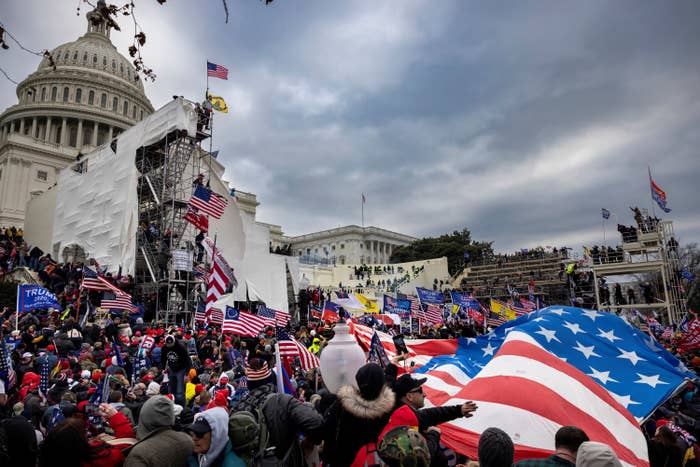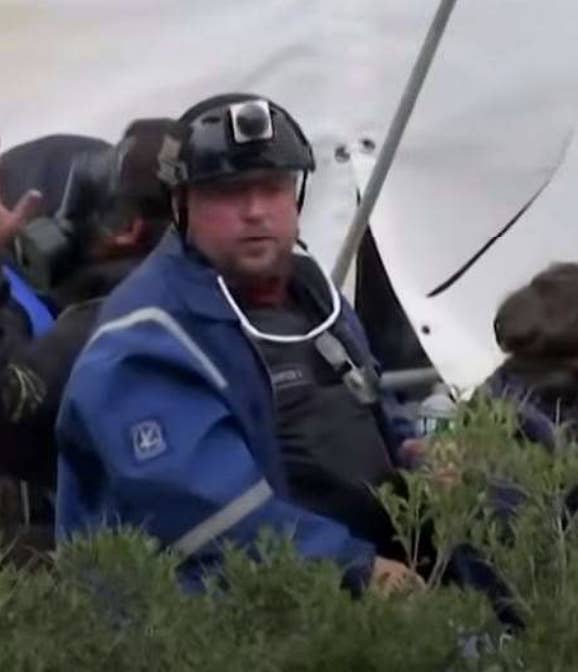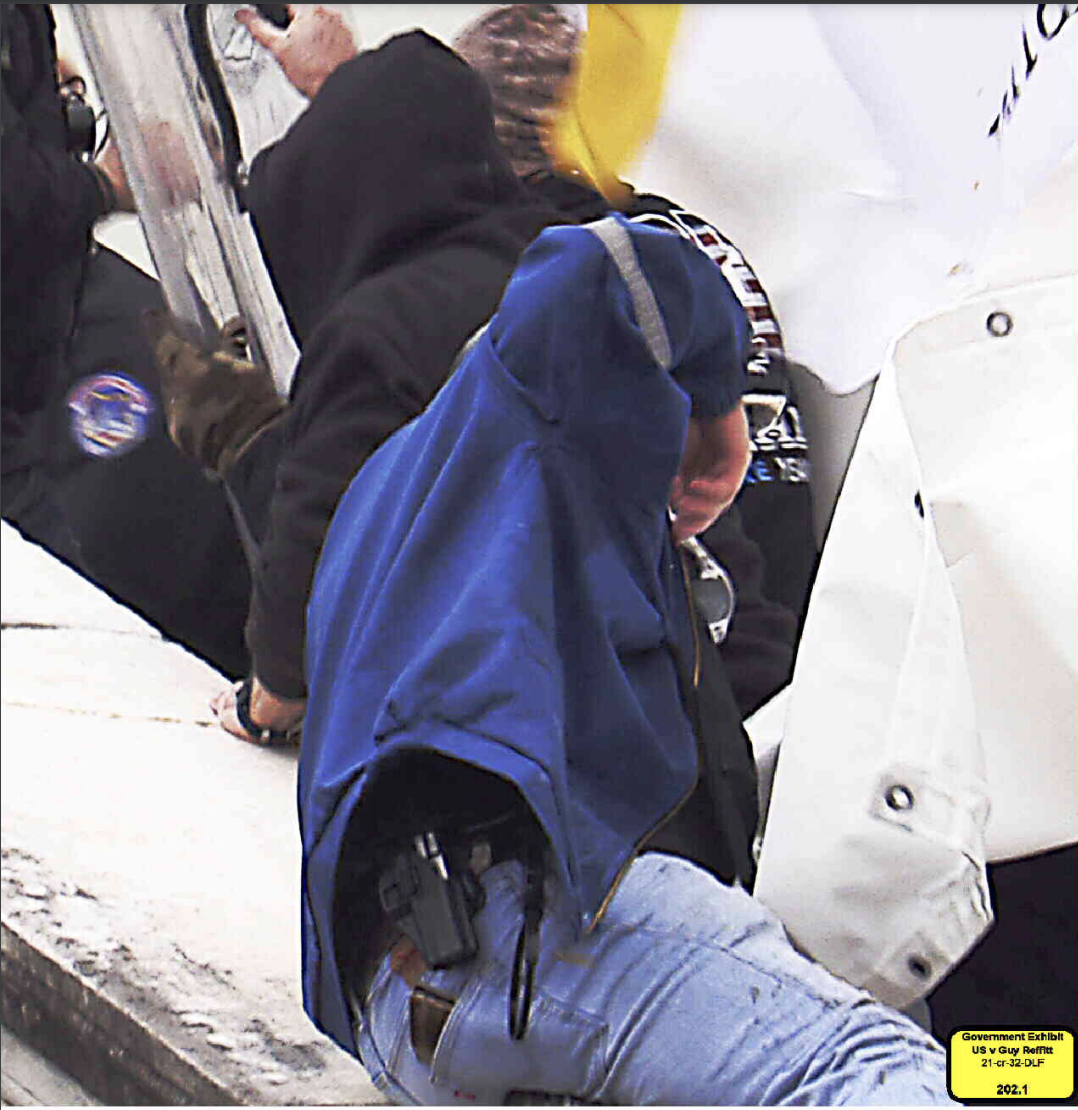
WASHINGTON — Guy Reffitt, a Texas man accused of bringing a handgun to the US Capitol during the Jan. 6 insurrection and the first person to stand trial in connection with the attack, was found guilty on all counts on Tuesday.
Reffitt’s case isn’t formally connected to any of the hundreds of pending criminal prosecutions stemming from the attack on the Capitol, but the verdict is a major win for the government. Prosecutors spent the past year negotiating plea deals, fending off legal challenges to the charges, and trying to keep the political maelstrom surrounding the insurrection out of the courtroom. A wild card in all of this was how a jury would respond to the government’s strategy for trying to hold each defendant responsible for a mass attack.
The jury spent roughly three hours deliberating; jurors were sent out shortly before 10 a.m. on Tuesday, and the judge announced they’d reached a decision at 1:30 p.m. They did not have any questions for the judge while they deliberated. Over the previous week, they’d heard testimony and seen evidence from the government that laid out in broad strokes the scope of the attack on the Capitol as well as the specific details of what Reffitt was doing before, during, and after the day.
Reffitt is set to be sentenced in person before US District Judge Dabney Friedrich on June 8. He’ll remain in custody until then.

Reffitt faced a five-count indictment charging him with bringing guns to DC to support a “civil disorder,” obstructing an official proceeding and aiding and abetting, being in a restricted area with a handgun, interfering with police during a civil disorder that affected interstate commerce, and obstructing justice by threatening his children not to cooperate with the FBI. The two obstruction counts were the most serious, carrying maximum sentences of 20 years in prison. Reffitt faced up to 10 years in prison if convicted of having a gun in a restricted area and up to five years for each of the civil disorder counts.
Reffitt did not testify, and his lawyer, William Welch III, did not put on any witnesses. Welch’s opening statement and closing arguments were brief, making the case to the jury that the government’s star witnesses weren’t reliable, presenting Reffitt as a man who talked big and inflated the truth, and insinuating that some of the government’s video and photo evidence might have been faked or edited. He urged the jury to find Reffitt guilty of the misdemeanor crime of illegally being in a restricted area — an offense carrying up to a year in prison, as opposed to 10 years with the weapon enhancement — but nothing else.
After the government rested its case, Welch made a motion to the judge to acquit his client and said he’d be filing his arguments in writing. Friedrich said she’d wait to rule on that motion until after the jury had finished deliberating, citing concerns that they might see media coverage of her decision or something she said; she referenced a recent incident in the federal court in Manhattan where jurors reported seeing push alerts on their phones about a judge’s ruling in former Alaska governor Sarah Palin’s defamation case against the New York Times.
Once the jury had left the room following the announcement of the verdict, Friedrich announced that although she’d consider additional briefing from Reffitt’s lawyer, she believed that based on the evidence presented at trial, a “rational jury” could find that the government had proved the “essential elements” of all of the charges against Reffitt beyond a reasonable doubt.
Friedrich had been the first judge presiding over Jan. 6 cases to reject a legal challenge to how the government had applied the charge of obstructing an official proceeding to the Capitol attack; she’d refused to dismiss it in Reffitt’s case as well. A number of her colleagues had joined her in denying similar motions filed by Jan. 6 defendants. On Monday, US District Judge Carl Nichols became the first judge to dismiss the charge in the case of defendant Garret Miller. Friedrich said on Tuesday that she’d read Nichols’ decision, and would consider additional arguments from Welch, but was not inclined to revisit her previous ruling.
As the verdict was announced, Reffitt, who was masked, didn’t show emotion and looked down at his hands, according to a pool reporter in the courtroom. A woman in the courtroom who had been sitting with Reffitt’s wife during the trial, later identified by Reffitt’s wife Nicole as Reffitt’s mother, cried. Nicole Reffitt entered the courtroom after the verdict had been read and she and Reffitt removed their masks, put their hands on their hearts, and he mouthed words to her.
Nicole Reffitt spoke with reporters outside the courthouse; she was with their daughters Sarah and Peyton; Peyton was holding a pair of brown boots that appeared to be the ones that her father had worn during the trial. Nicole Reffitt denounced the verdict, saying that it was “against all American people,” and urged other Jan. 6 defendants not to take plea deals, saying that her husband was being used to “intimidate” them. Reffitt has been held at the DC jail with several dozen Jan. 6 defendants.
“This fight has just begun,” she said.
Guy Reffitt's wife Nicole spoke to reporters outside the courthouse, denouncing the verdict as "against all American people": "This fight has just begun" (Note the brown boots being carried, which appear to be the same ones Reffitt wore during the trial)
Nicole Reffitt also criticized prosecutors for involving Peyton, who was 16 around the time of Jan. 6. Asked if she had felt threatened by her father — the jury heard testimony from Reffitt’s son Jackson that he’d heard Reffitt tell Peyton that he’d put a bullet through her phone if she recorded him after he returned from DC — Peyton said no. Prosecutors had put Peyton on their witness list, but ended up not calling her to testify.
The Reffitts’ son Jackson had not been seen at court since he testified last week against his father and talked about his damaged relationship with his family; Nicole Reffitt said she knew Jackson was “hurting” along with the rest of them and that she’d speak with him once she got back to her hotel.
Reffitt, a 49-year-old father of three from Wylie, Texas, has been in jail since his arrest shortly after the insurrection. He had been a member of the Texas Three Percenters; the movement is a collection of loosely affiliated militant groups rooted in the belief — a mistaken one, an FBI witness told the jury — that only 3% of American colonists joined the fight against the British.

Much of the government’s case centered on Reffitt’s own words. Prosecutors had witnesses read aloud text messages that Reffitt sent to his family and members of the Texas Three Percenters, where he discussed his plans to go to DC and his desire to “remove” members of Congress, as well as his descriptions of his role in storming the Capitol in the hours and days that followed. The jury saw footage from a camera that Reffitt attached to his helmet and wore to the “Stop the Steal” rally at the Ellipse near the White House on the morning of Jan. 6, where he was heard discussing plans to “drag” lawmakers out of the Capitol and that he was “packing heat.”
Prosecutors showed a collection of videos from different angles depicting a person in a blue jacket, identified as Reffitt, slowly making his way up a railing on a stairway on the west side of the Capitol with a large crowd behind him. He isn’t accused of going inside the Capitol; Reffitt later told his family that he had to stop after being pepper-sprayed. Prosecutors described him as the “tip of the mob’s spear,” saying that he led the crowd up during the initial breach of the steps and waved them on once he was incapacitated.
A key witness for the government was Reffitt’s 19-year-old son Jackson Reffitt, who reported his father to the FBI in late December 2020 after Guy Reffitt had shared his plan to go to DC. Jackson screenshotted text messages that his father sent and secretly recorded Reffitt talking about his experience once he returned home, and continued to cooperate with the FBI. With his father sitting on the other side of the courtroom and his mother in the gallery, Jackson talked about how he didn’t regret his decision to come forward, given his fear about what his father might do, but that it had seriously damaged his relationship with his family.
Jackson’s testimony was central to the charge that Reffitt threatened Jackson and his daughter Peyton, who was 16 at the time, after he returned home. Jackson told the jury that on the morning of Jan. 11, Reffitt had told them that if they turned him in, they were traitors, and that “traitors get shot.” A little later, as Peyton sat on her phone, Jackson said, Reffitt told her that if she was recording him he’d put a bullet through the device. Prosecutors had planned to call Peyton as a witness but decided not to on the last day of testimony; they didn’t provide a reason for the change in plans.
Reffitt’s wife, Nicole Reffitt, has been at court for the trial. Peyton sat in the courtroom once she was no longer a potential witness, and a pool reporter (there’s limited public seating due to COVID protocols) noted that Reffitt smiled and blew a kiss to his daughter when she entered.
The government’s other central witness was Rocky Hardie, who traveled to DC with Reffitt and was a former member of the Texas Three Percenters. Hardie explained that the group believed in supporting both law enforcement and the government — as long as they followed the Constitution. The jury saw texts that Reffitt sent justifying the use of force to remove what he believed was a corrupt legislative branch; some of his most specific violent rhetoric was directed at House Speaker Nancy Pelosi, but he talked about wanting to remove Republicans like Texas Sen. Ted Cruz and Senate Minority Leader Mitch McConnell, too.
Hardie testified about how he and Reffitt each brought a rifle and a handgun to Washington, left the assembled rifles in the car at their hotel on the morning of Jan. 6, and carried their holstered handguns with them as they walked downtown. Hardie said that he got separated from Reffitt after former president Donald Trump spoke at the “Stop the Steal” rally; Hardie said he didn’t see Reffitt again until later in the afternoon, but they remained in radio contact.
Hardie said he made his way onto the Capitol grounds with his firearm, but he hasn’t been charged to date. The jury learned that he signed an immunity agreement with the government; it didn’t shield him against prosecution completely, he said, but it meant that the government couldn’t use anything he said or any evidence he turned over in connection with his agreement against him.
The jury heard from US Capitol Police officers who confronted Reffitt on a stairway outside the west side of the building, firing pepper balls, other projectiles, and chemical spray to try to stop him from advancing; a 24-year Capitol Police veteran who started crying as she described being in the command center trying to protect officers as the riot unfolded; and a former Senate counsel who explained what Congress was doing on Jan. 6 and testified about watching officers lock down the Senate chamber as the building was breached.
FBI Special Agent Laird Hightower, the lead case agent in Texas, talked the jury through a zoomed-in image that appeared to show Reffitt at the Capitol taken from video recorded by independent journalist Emily Molli. Hightower said he’d identified a holster on Reffitt’s hip and a “silvery metallic linear object” — what prosecutors contend was his Smith & Wesson pistol. The jury saw the handgun as well as the AR-15–style rifle that Hardie said Reffitt brought to DC, both of which the FBI seized during a search of Reffitt’s home.
The jury also saw large plastic flexible handcuffs that Hardie said Reffitt brought — which he brought, Hardie said, in case they needed to “detain” anybody — and a tactical vest that Reffitt wore, outfitted with what an FBI witness identified as 22 pounds of ballistic plates. Hardie said Reffitt told him he brought the cuffs in case they needed to "detain" anybody.
The outcome of Reffitt’s case is expected to have a ripple effect on hundreds of pending cases. The vast majority of defendants facing prosecution for playing some role in the attack on the Capitol are being prosecuted individually, but many face some of the same charges as Reffitt. The government’s evidence of the extent of the breach of the Capitol is a shared feature across all of these cases. Reffitt’s trial offered other defendants and their lawyers a first look at how prosecutors planned to present the insurrection to jurors, and see how it was received.
Trials already are scheduled throughout the rest of the year for more than four dozen defendants. Of the 750-plus defendants charged to date, more than 220 have pleaded guilty.

